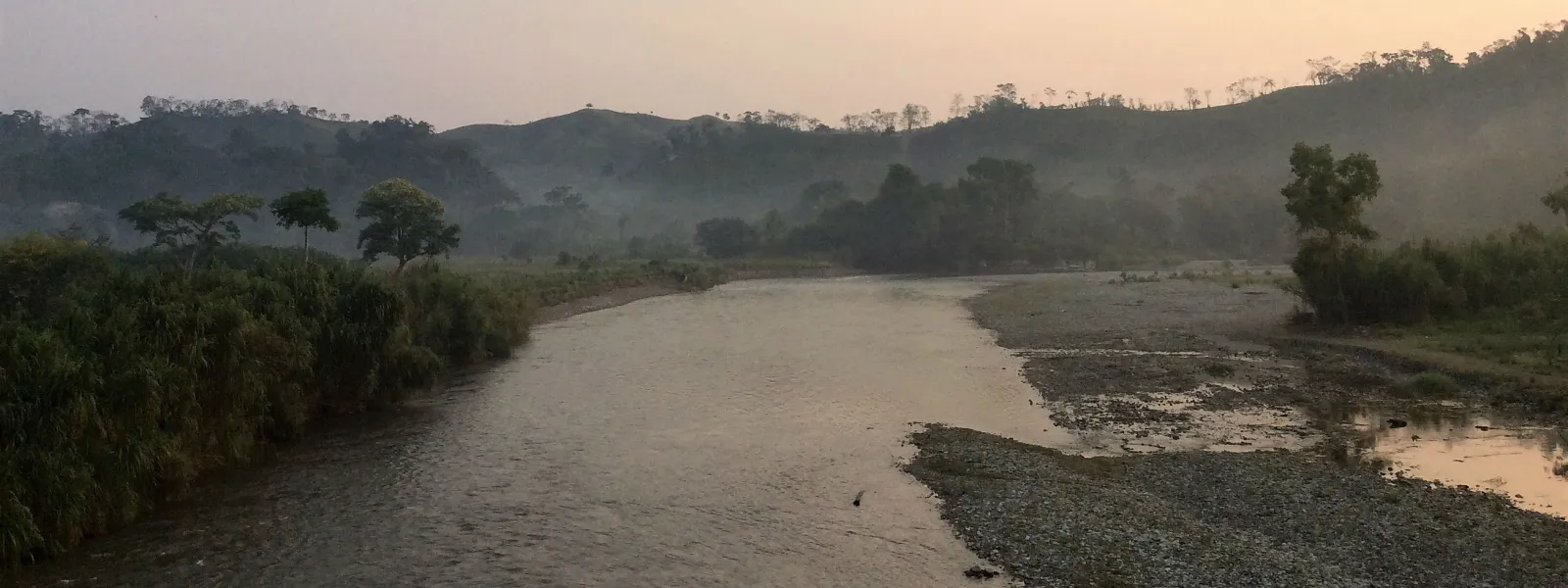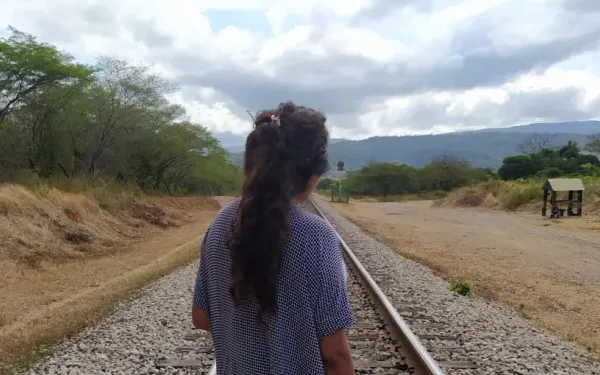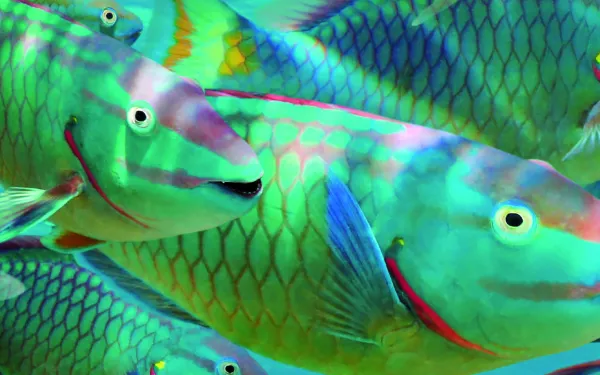
Project
Liliana Ávila /AIDAMayan women’s struggle before the Inter-American Development Bank in Guatemala
Mayan communities succeeded in getting the IDB Invest to develop a responsible exit plan after withdrawing its financing for two hydroelectric projects that negatively impacted ecosystems and the livelihoods of indigenous peoples, especially women, in the micro-region of Yichk'isis (Ixquisis).
In the struggle to defend their water, territory and way of life, indigenous Mayan communities in the Yichk'isis (Ixquisis) micro-region of northern Guatemala convinced the Inter-American Development Bank Group to withdraw its financing of two hydroelectric dams whose implementation violated their rights. The decision was also significant in that the IDB, for the first time, designed a responsible exit plan.
That historic advance was the result of the complaint that the communities filed in August 2018—with the support of AIDA, the Plurinational Ancestral Government of the Akateko, Chuj, and Q'anjob'al Native Nations, and the International Platform against Impunity. The complaint was filed with the Independent Consultation and Investigation Mechanism (MICI), the IDB Group's accountability office.
In resolving the case in September 2021, the MICI concluded that IDB Invest failed to comply with its own operational policies and safeguards, in the framework of the financing granted to the company Energía y Renovación S.A. for the implementation of the San Mateo and San Andrés hydroelectric projects.
Learn more about this achievement
In the mountains of Northwestern Guatemala, near the border with Mexico, the land is rich and fertile. Several important rivers and many other water sources feed the soil.
The residents of these mountains, many indigenous women of Mayan descent, have long depended on the waters to nourish them, to provide them with fish, as well as for agriculture, sanitation, and cooking.
But the construction of the San Mateo and San Andres dams has caused water scarcity and the contamination of rivers and other natural resources long cherished by the communities.
The near lack of water has also drastically reduced harvests, lessening the income gained from selling corn, wheat, beans, coffee, sugar cane and other products in the market. As a result, the conditions of poverty in the area have deepened.
And the risk situation is profound, particularly for women, who have played a very important role in the defense of water and territory threatened by hydroelectric projects, and are therefore victims of intimidation and stigmatization.
As guardians of their land and water, they have come to its defense and they’ll continue to prevent environmental deterioration from further harming their families.
Read our fact sheet on the case

Related projects

OECD to investigate human rights abuses filed against the owners of Cerrejón coal mine; BHP, Anglo American and Glencore
Parallel complaints also filed in Ireland against state owned-company for purchasing coal and Dublin-based sales wing of mining enterprise. Multiple National Contact Points (NCPs) of the Organisation for Economic Co-operation and Development (OECD) will begin the process of investigating three international mining giants (BHP, Anglo American and Glencore) and Ireland’s state-owned energy provider, the ESB, over serious human rights abuses and devastating environmental pollution at the Cerrejón coal mine in Colombia. Parallel complaints were filed simultaneously in Australia, Ireland, Switzerland and the UK by the Global Legal Action Network (GLAN) with the support of international development agency Christian Aid Ireland as well as Colombian and international human rights and environmental NGOs - CINEP, CAJAR, AIDA, ABColombia and ASK. If successful, the three companies which jointly own the Cerrejón mine will have to take steps to comply with the OECD Guidelines for Multinational Enterprises, including progressively closing down the mine in full and environmental restoration. The complaints against the mining giants also call for the full compensation of communities for the harms they have suffered. The complaints outline how the Cerrejón mine, one of the largest open-pit mines in the world, is linked to the forced displacement of indigenous and Afro-Colombian communities and the widespread, persistent and extreme pollution of the air and water in the vicinity of the mine. High concentrations of harmful metals, which can cause diseases such as cancer, were found by Colombia’s Constitutional Court to exist in the blood of those living nearby. The complaints point to Cerrejón’s failure to comply with multiple Colombian court judgments against it. In September, several prominent UN human rights experts called for some of the mine’s operations to be suspended following a request to intervene by Wayuu indigenous people. The complaints allege that the parent companies of the Cerrejón mine, as its joint owners, are responsible under the OECD Guidelines for Multinational Enterprises for the harms caused by its operations. Separate complaints have also been lodged against Dublin-based Coal Marketing Company (CMC), which is the exclusive marketer of coal from the Colombian mine, as well as Ireland’s Electricity Supply Board (ESB), which has been a major purchaser of the mine’s coal. In 2019, the UN Committee on the Elimination of Racial Discrimination recommended that Ireland “consider stopping purchasing coal from the Cerrejón mine”. All five complaints have been lodged with the relevant National Contact Points for the OECD, which are tasked with ensuring that companies comply with the OECD Guidelines for Multinational Enterprises. Director of GLAN Dr Gearóid Ó Cuinn said: “These parallel complaints in four different countries point to a systematic failure to respect basic human rights standards from the extraction, to the marketing, to the purchasing of Cerrejon coal. The long-standing abuses at the mine have been so egregious that there is no way for enterprises to respect human rights law and do business with Cerrejón.” Sorley McCaughey of Christian Aid Ireland said: “We see the impact that corporate human rights abuses are having in every corner of the world and the Cerrejón case underscores the inadequacy of voluntary guidelines for multinational companies. Governments globally, including the UK and Ireland, must introduce mandatory human rights and environmental due diligence legislation for companies to ensure they do not undermine the human rights of workers or the communities in which they work.” Rosa María Mateus Parra, lawyer with CAJAR, a Colombian human rights organisation and signatory to the complaints, said: “This is a striking example of the role played by large multinational companies in fuelling injustice. The people of La Guajira have borne the huge social and environmental costs of the mine, while harmful fossil fuel coal is exported around the world in the midst of the climate crisis and a small number of companies record huge profits.” Notes for editors If upheld the complaints filed in Australia, Switzerland and the UK would require joint-owners BHP, Glencore and Anglo American to close down the Cerrejón mine and compensate the affected communities for the harms it has caused. If upheld the separate complaint in Ireland against Dublin-based CMC would require it to stop selling Cerrejón coal. The complaint was submitted by Global Legal Action Network (GLAN), supported by Christian Aid Ireland, the Centro de Investigación y Educación Popular (CINEP), the Colectivo de Abogados ‘José Alvear Restrepo’ (CAJAR), Interamerican Association for Environmental Defense (AIDA), ABColombia and ASK - Arbeitsgruppe Schweiz Kolumbien. The Global Legal Action Network (GLAN) is a non-profit organisation that works to pursue innovative legal actions across borders to challenge powerful actors involved in human rights violations and systemic injustice by working with affected communities. GLAN has offices in the UK (London) and Ireland (Galway) | @glan_law | www.glanlaw.org. press contacts: Victor Quintanilla (México), AIDA, [email protected], +5215570522107 Dr Gearóid Ó Cuinn (Director), GLAN, [email protected], +447521203427
Read more
Fact Sheet: SPAW Protocol (Specially Protected Areas and Wildlife)
The Convention for the Protection and Development of the Marine Environment in the Wider Caribbean Region (Cartagena Convention) and its Protocol for Specially Protected Areas and Wildlife (SPAW Protocol) establishes that Contracting Parties have the obligation to regulate the protection of the vulnerable species and ecosystems of the region.The revised criteria for the nomination of species (1, 3, 4, 5, 6 and 10) determines the need to include essential species for vulnerable ecosystems - such as coral reefs, mangroves and seagrasses - in the species lists of Annexes II and III of the SPAW Protocol.The national or regional measures imply in a different way protection processes, biological monitoring of species, fishing recovery zones; analysis of catch data, health status of ecosystems, population dynamics and size; closed periods; and regulation of the capture, possession, transport, trade or total prohibition of the use of the species.In 2018, the Scientific and Technical Advisory Committee (STAC) prioritized the evaluation of herbivorous fish and currently the Species Working Group carries out the evaluation of parrotfish through the integration and analysis of scientific and regulatory data.Eleven of the 17 countries that have signed the Protocol have generated regulatory measures on herbivorous fish. Some regulatory experiences are in force, others are not, and there are those that came into force recently. Download the Fact Sheet in EnglishDownload the Fact Sheet in SpanishDownload the Fact Sheet in French
Read more
7 AIDA Advances of 2020
It was a year unlike any other. This new reality makes our victories and daily accomplishments all the more sweet. So we’re especially proud to report on the progress we've made toward a healthy environment and climate justice in Latin America. 1. Safeguarding the High Seas More than 99% of the global high seas—waters beyond national jurisdiction—are unprotected. To remedy this, over the past year we have led Latin American representation in the High Seas Alliance, collaborating with governments to negotiate an ambitious United Nations treaty to protect these waters and key migratory species of sharks, whales, turtles and tuna. The high seas are both essential to long-term ocean health and a critical carbon sink that helps mitigate climate change. 2. Influencing Divestment in the Amazon For nearly a decade we have worked to halt Brazil’s Belo Monte dam, which has displaced thousands of indigenous people and devastated hundreds of rare species. This year, our testimony led the Norwegian Pension Fund, the world's largest state-owned fund, to exclude one of the dam’s main financers, Eletrobras, from its portfolio because of environmental and human rights violations caused by the dam. This is a notable step toward justice for affected communities. 3. Defending Páramos from Mining We continued to protect páramos in Colombia and Ecuador from mining. These biodiverse, high-altitude forests and wetlands are critical carbon sinks that also provide fresh water for millions of people and habitat for endangered species. Our team contributed legal and technical expertise, and, in the case of Santurbán in Colombia, helped build capacity among local attorneys who are now leading the lawsuit to protect this páramo. 4. Protecting Environmental Defenders Latin America is the most dangerous region in the world for environmental defenders. This year, AIDA brought together more than 70 prominent environment defenders from 14 countries across Latin America to share current information about risks and effective strategies for defense. Participants discussed their challenges, identified gaps in knowledge, and developed new approaches for protecting themselves and their territories. 5. Halting Extractive Energy Development Our ongoing legal and technical expertise was critical to halting fossil fuel expansion. We continued litigation to uphold the moratorium on fracking and, helped prevent further coal mining expansion in Colombia, supported communities in Chile affected by coal power plants, and led efforts to hold International Financial Institutions accountable for funding harmful hydropower Guatemala and Colombia. This work is key to promoting the just transition toward truly clean energy. 6. Preserving Marine Biodiversity in Patagonia The Chilean Magallanes region is home to some of the largest whales and dolphins and one of the most pristine areas on our planet. The greatest environmental threat for this region is the salmon farming industry. Building on our past work, we used the law to halt expanded salmon farming and expose the harms the industry brings. Our work closed one salmon farm and set a precedent for the closure of seven others, all of which are under review by Chilean courts. 7. Strengthening Indigenous Land Management in Colombia In coalition with four indigenous communities of the Sierra Nevada de Santa Marta, we continued protecting their lands from illegal mining. Facing hundreds of proposed projects, we helped implement legal strategies demanding a new territorial management plan that recognizes the traditional governing authority of the indigenous. We also helped strengthen community capacity through workshops on environmental protection.
Read more